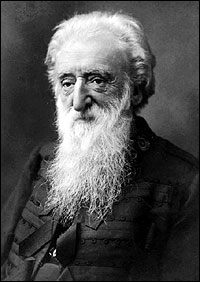William Booth nejznámější citáty
William Booth: Citáty anglicky
Varianta: I consider that the chief dangers which confront the coming century will be.... religion without the Holy Ghost, Christianity without Christ, forgiveness without repentance, salvation without regeneration, politics without God and heaven without hell.
As quoted in Revolution (2005) by Stephen Court & Aaron White .
“Go for souls and go for the worst.”
As quoted in The Life of General Booth (1913) by Hulda Friedrichs
An unspecified platform appeal, as quoted in The Musical Salvationist (September 1927). Several variants of this exist, some of them credited to his speech at the Royal Albert Hall on May 9, 1912, as researched "While Women Weep - I'll Fight" by Gordon Taylor at the International Heritage Centre (19 July 1996) http://www1.salvationarmy.org/heritage.nsf/36c107e27b0ba7a98025692e0032abaa/cdc6918c833e9a3d802568cc00539b8f!OpenDocument
Variants:
While women weep as they do now, I'll fight. While little children go hungry as they do now, I'll fight,. while men go to prison, in and out, in and out, as they do now, I'll fight.
As quoted in "To the General" by Charles Coller, in All the World (April 1906), p. 169
While women weep, as they do now, I'll fight; while little children go hungry, as they do now, I'll fight; while men go to prison, in and out, in and out, as they do now, I'll fight; while there is a drunkard left, while there is a poor lost girl upon the streets, while there remains one dark soul without the light of God, I'll fight — I'll fight to the very end!
As quoted in Booth the Beloved (1949) by J. Evan Smith, pp. 122-124; this version seems to have become the basis of the most quoted variants.
While Women weep as they do now, I'll fight. While little children go hungry, as they do now, I'll fight. While men go to prison, in and out, in and out, I'll fight. While there is a drunkard left, while there is a poor lost girl upon the streets, While there remains one dark soul without the light of God, I'll fight. I'll fight to the very end!
As quoted in What price the poor? William Booth, Karl Marx and the London Residuum (2005) by Ann M. Woodall, p. 218
Kontext: As long as women suffer as they do I will fight! As long as little children hungering go, as they now do, I will fight. As long as men go to the prisons, in and out, in and out, as they now do, I will fight. All who are not on the ship are in the sea. Every Soldier must do his utmost to save them.
“Let the business of the world take care of itself … My business is to get the world saved”
"The Risks" in The War Cry (20 December 1884)
Kontext: Let the business of the world take care of itself … My business is to get the world saved; if this involves the standing still of the looms and the shutting up of the factories, and the staying of the sailing of the ships, let them all stand still. When we have got everybody converted they can go on again, and we shall be able to keep things going then by working half time and have the rest to spend in loving one another and worshipping God.
In Darkest England : And The Way Out (1890), p. 81
“Why should the Devil have all the best tunes?”
Though it is widely attested that Booth used this adage, it originates in the 18th century, being attributed to George Whitefield, in The Monthly Review, or, Literary Journal, Vol. 49 (June 1773 - January 1774), p. 430; it has also been reported as a remark made by Rowland Hill, when he arranged an Easter hymn to the tune of "Pretty, Pretty Polly Hopkins, in The Rambler, Vol. 9 (1858), p. 191, as well as being attributed to Charles Wesley, and sometimes his brother John.
Misattributed
"The Risks" in The War Cry (20 December 1884)
